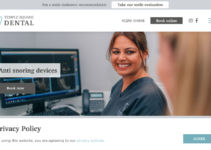Title: Understanding Sleep Apnea: Causes, Symptoms, and Treatment Options
Introduction
Sleep apnea is a common sleep disorder that affects millions of people worldwide. It is characterized by interrupted breathing during sleep, leading to reduced oxygen intake and poor sleep quality. This article aims to provide a comprehensive overview of sleep apnea, including its causes, symptoms, and various treatment options available.
What is Sleep Apnea?
During sleep, sleep apnea is a condition that causes breathing to be obstructed. It occurs when the muscles in the throat relax and narrow, causing a temporary cessation of breathing. This interruption in breathing can last for a few seconds to minutes and can occur multiple times throughout the night.
Causes and Risk Factors
There are several factors that can contribute to the development of sleep apnea. These include obesity, smoking, alcohol consumption, and certain medical conditions such as high blood pressure and type 2 diabetes. Additionally, structural abnormalities in the airway, such as enlarged tonsils or a deviated septum, can also increase the risk of sleep apnea.
Symptoms of Sleep Apnea
The most common symptom of sleep apnea is loud snoring. However, snoring alone does not necessarily indicate sleep apnea. Other symptoms may include excessive daytime sleepiness, morning headaches, frequent awakenings during the night, and difficulty concentrating.[0] It is important to note that some individuals may not be aware of their symptoms and may only become aware of their condition when their partner complains about their snoring or disrupted sleep patterns.
Health Risks Associated with Sleep Apnea
Sleep apnea can have serious health consequences if left untreated. It can lead to decreased blood oxygen levels, high blood pressure, and an increased risk of cardiovascular diseases, stroke, and type 2 diabetes. Additionally, sleep apnea can significantly impact an individual's quality of life, leading to daytime fatigue, irritability, and impaired cognitive function.
Treatment Options for Sleep Apnea
Fortunately, there are several treatment options available for managing sleep apnea. The most common and effective treatment is continuous positive airway pressure (CPAP) therapy.[0] This involves wearing a mask over the nose or mouth during sleep, which delivers a continuous flow of air to keep the airway open.[1] CPAP therapy has been shown to improve symptoms and reduce the health risks associated with sleep apnea.
In cases where CPAP therapy is not well-tolerated or ineffective, alternative treatment options may be considered. These include oral appliances, which help to reposition the jaw and tongue to keep the airway open, and surgical interventions to correct structural abnormalities in the airway. Additionally, recent studies have shown promising results with the use of transcutaneous electrical nerve stimulation (TENS) machines, which provide light electric stimulation to keep the airway open during sleep.
Lifestyle Changes to Reduce Snoring and Sleep Apnea
In addition to medical treatment, making certain lifestyle changes can help reduce snoring and alleviate sleep apnea symptoms. These include losing excess weight, quitting smoking, avoiding alcohol and sedatives, and establishing a regular sleep schedule.[2] Furthermore, dietary modifications, such as avoiding dairy and wheat-based products, consuming anti-inflammatory foods like fruits, vegetables, nuts, and healthy fats, can also help prevent snoring and improve sleep quality.
Conclusion
Sleep apnea is a common sleep disorder that can have serious health implications if left untreated. It is important to be aware of the symptoms and risk factors associated with sleep apnea and seek medical attention if necessary. With the appropriate diagnosis and treatment, individuals with sleep apnea can experience significant improvements in their sleep quality and overall well-being. Remember, a good night's sleep is essential for optimal health and vitality.
0. “Sleep Apnea And Driving Semi Trucks!” www.truckstopcanada.com, 2 Sep. 2023, https://www.truckstopcanada.com/news/sleep-apnea-driving-semi-trucks-39222/
1. “TENS machine may offer new treatment option for patients with …” www.news-medical.net, 2 Sep. 2023, https://www.news-medical.net/news/20230803/TENS-machine-may-offer-new-treatment-option-for-patients-with-sleep-apnea.aspx
2. “Avoiding six foods can help you stop snoring, experts say – Wales …” www.walesonline.co.uk, 2 Sep. 2023, https://www.walesonline.co.uk/news/health/avoiding-six-foods-can-help-27539545





